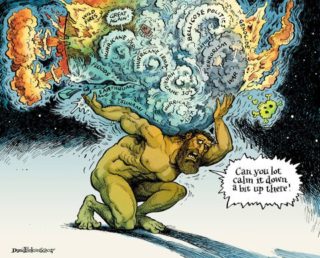The Bloc Québécois is calling on Quebeckers to vote for candidates “who resemble you” in the election, prompting NDP Leader Jagmeet Singh to denounce the message as unacceptable and divisive.
In his closing statement during Wednesday’s French-language debate, Bloc Leader Yves-François Blanchet called on voters to “opt for men and women who resemble you, who share your values, who share your concerns and who work for your interests, and only for the interests of Quebeckers.” The statement was also posted on the Bloc’s Twitter feed.
Mr. Singh regularly faces questions about wearing a turban, including an encounter with a man in Montreal who urged him this week to take it off and “look like a Canadian.”
“In 2019, I hope people aren’t going to vote based on the way someone looks. They are going to vote for someone based on what they believe in, what they care about and how they are going to make your life better,” Mr. Singh told reporters on Thursday.
In an interview on Thursday, Mr. Blanchet said the statement was in no way a reference to the physical attributes of candidates or what they wear. He is a staunch defender of Quebec’s secularism law that prevents some provincial employees from wearing religious symbols at work.
“We have a party platform and those who recognize themselves in that platform will vote for us,” he said in an interview. “The Conservatives will get the votes of those who resemble them, the Liberals will get the votes of those who resemble them, and so on. This is a false controversy.”
Mr. Blanchet is the target of political attacks after holding his own in Wednesday night’s French-language leaders’ debate, which attracted more than one million viewers. During the event, he accused Liberal Leader Justin Trudeau and Conservative Leader Andrew Scheer of moving too slowly on the transition to renewable sources of energy.
The Liberals are fighting back, pointing out that as Quebec’s environment minister from 2012 to 2014, Mr. Blanchet supported oil exploration on Anticosti Island. Mr. Blanchet said he was unsure at the time whether the exploration would move to extraction. He said profits would have been invested into the transition to clean energy.
At a rally in Montreal, Mr. Trudeau called on Quebeckers to vote on Oct. 21 for a party that will put in place measures to bring down greenhouse-gas emissions.
“It takes a government to get it done. Andrew Scheer does not want to fight climate change and the Bloc cannot put in place a pan-Canadian plan to fight climate change,” he said.
At a news conference in Kingsclear, N.B., Mr. Scheer pointed out Bloc MPs will necessarily be in opposition after the election, while Conservative MPs would be sitting at the “decision-making table” if his party forms the next government. Asked about the Bloc’s tweet, Mr. Scheer said the party is playing on “divisions within the Canadian population.”
“I believe in finding the common ground between all different types of Canadians, people who have come from different parts of the world, and celebrating what unites us,” Mr. Scheer said.
The Bloc is hoping to prove that it can thrive as a political force on the federal stage even if Quebec’s sovereigntist movement has waned at the provincial level.
Daniel Béland, the director of the McGill Institute for the Study of Canada, said the Bloc is benefiting from two factors: a dissatisfaction with Mr. Trudeau’s Liberal government among progressive voters and environmentalists in Quebec, and the Bloc’s ability to carry the nationalist message of the François Legault government on the federal stage.
“Mr. Blanchet is exploiting the fact that Quebeckers aren’t entirely satisfied with the decisions of the Trudeau government,” Prof. Béland said.
He added that having a provincial government that seeks autonomy in areas such as immigration and culture is “manna from heaven” for the Bloc.
DANIEL LEBLANC
PARLIAMENTARY AFFAIRS REPORTER
The Globe and Mail, October 3, 2019

